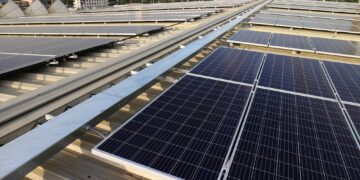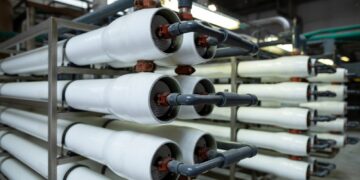Saudi Arabia is grappling with a significant water scarcity crisis, consuming 30 billion cubic meters annually while producing only 2 billion cubic meters of surface water. This gap necessitates seawater desalination, particularly in urban and industrial areas. However, desalination is energy-intensive, typically relying on fossil fuels, which incur high economic and environmental costs. To address these challenges, ATESS has developed a solar-powered energy storage solution to enhance the sustainability of desalination processes.
The Energy Challenge of Desalination
Desalination is crucial for Saudi Arabia’s water supply, especially in areas lacking natural freshwater sources. These plants require substantial electricity, which is problematic in remote regions away from power grids. Diesel generators are often used, leading to high costs and carbon emissions. ATESS offers an off-grid solar energy storage system that combines photovoltaic (PV) systems with battery storage, tapping into Saudi Arabia’s abundant sunlight as a reliable power source.
ATESS’s Containerized Solution for Harsh Desert Conditions
An example of ATESS’s approach is a desalination plant in a desert region without grid access, operating non-stop to deliver fresh water. It is powered by a 950 kWp PV array and an ATESS containerized energy storage system, featuring two 40-foot containers with bi-directional inverters and battery racks, forming a 3.66 MW lithium-ion battery system.
The system’s core, the ATESS Power Conversion System (PCS), manages energy flow between the PV system, battery storage, and desalination operations. A backup PCS500 unit ensures continuous operation, even if primary systems fail, reducing downtime risks. The system is designed to withstand harsh desert conditions with specialized insulation and compartment ratings to maintain performance.
Smart Energy Management
ATESS’s system primarily uses solar energy and battery storage, reducing fossil fuel dependency. During the day, the PV array powers the desalination plant, storing excess energy for nighttime use. If battery levels drop, the system switches to Diesel Generator Mode, recharging batteries and minimizing fuel use, thereby lowering operational costs and extending generator lifespan.
Economic and Environmental Impact
The ATESS solution offers economic and environmental benefits by utilizing Saudi Arabia’s solar resources, cutting reliance on expensive fossil fuels and reducing operational costs. Carbon emissions decrease by approximately 890 tons annually, supporting Saudi Arabia’s sustainability goals and environmental protection efforts.
A Model for Sustainable Water Management
This project exemplifies the role of renewable energy in addressing water scarcity. By integrating ATESS’s energy storage technology with solar power, Saudi Arabia tackles both water and energy challenges, setting a precedent for sustainable water management in arid regions. It not only meets immediate water needs but also provides a model for other areas facing similar challenges.
Through its innovative approach, ATESS aids Saudi Arabia in transitioning to a sustainable water supply model, addressing water scarcity while promoting renewable energy and environmental sustainability. This system serves as a framework for similar global projects, turning water scarcity into abundance and showcasing renewable energy’s potential in building resilient communities.









